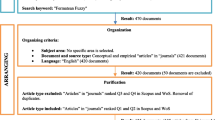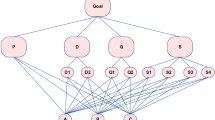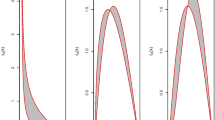Abstract
Trust network analysis has been widely applied in various fields, such as group recommendation, group decision-making and other related areas. In this paper, we focus on obtaining the complete trust network in which experts express their trust relationships for another with a single linguistic term or distribution assessments of a linguistic term set. We first discuss the conditions of obtaining the complete trust network, and the propagation and aggregation of the trust relationships with a single linguistic term. Since the linguistic term set may be symmetric and uniform, symmetric and non-uniform, or asymmetric and non-uniform, we translate linguistic terms into numerical indexes and define the propagation operator based on the semantics of the linguistic term and the Archimedean t-norm. The propagation result is translated to 2−tuple linguistic model because it may not exist in the initial linguistic term set. Some properties are proposed to verify that the proposed operator is compatible with human thought. Then the 2−tuple distribution assessments on a linguistic term set are defined, and the other aggregation operator is proposed to propagate linguistic distribution assessment trust relationships. The second aggregation operator focuses on both the aggregation of linguistic terms and symbolic proportions of linguistic terms and is a generalization of the first operator. Finally, a numerical example of CouchSurfing comparative analyses further demonstrates that the proposed operators are effective and reasonable, and can consider the different semantics of a linguistic term in practical application.






Similar content being viewed by others
References
Victor, P., Cornelis, C., De Cock, M.: Gradual trust and distrust in recommender systems. Fuzzy Set. Syst. 160, 1367–1382 (2009)
Victor, P., Cornelis, C., De Cock, M., Herrera-Viedma, E.: Practical aggregation operators for gradual trust and distrust. Fuzzy Set. Syst. 184(1), 126–147 (2011)
Binesh, N., Ghatee, M.: Distance-aware optimization model for influential nodes identification in social networks with independent cascade diffusion. Inform. Sci. 581, 88–105 (2021)
Liu, H.B., Rodríguez, R.M.: A fuzzy envelope for hesitant fuzzy linguistic term set and its application to multicriteria decision making. Inform. Sci. 258, 220–238 (2014)
Li, S.L., Wei, C.P.: A two-stage dynamic influence model-achieving decision-making consensus within large scale groups operating with incomplete information. Knowl. Based Syst. 189, 105132 (2020)
Zhan, J.: Secure collaborative social networks. IEEE Trans. Syst. Man Cybernet. Part C 40(6), 682–689 (2010)
Wu, J., Chiclana, F.: A social network analysis trust consensus based approach to group decision-making problems with interval-valued fuzzy reciprocal preference relations. Knowl. Based Syst. 59, 97–107 (2014)
Chu, J.F., Liu, X.W., Wang, Y.M.: Social network analysis based approach to group decision making problem with fuzzy preference relations. J. Intell. Fuzzy Syst. 31(3), 1271–1285 (2016)
Wu, J., Li, X., Chiclana, F., Yager, R.: An attitudinal trust recommendation mechanism to balance consensus and harmony in group decision making. IEEE Trans. Fuzzy Syst. 27(11), 2163–2175 (2019)
Liu, Y.J., Liang, C.Y., Chiclana, F., Wu, J.: A trust induced recommendation mechanism for reaching consensus in group decision making. Knowl. Based Syst. 119, 221–231 (2017)
Liu, B.S., Zhou, Q., Ding, R.X., Palomares, I., Herrera, F.: Large-scale group decision making model based on social network analysis: Trust relationship-based conflict detection and elimination. Eur. J. Oper. Res. 275(2), 737–754 (2019)
Wu, J., Chiclana, F., Herrera-Viedma, E.: Trust based consensus model for social network in an incomplete linguistic information context. Appl. Soft Comput. 35, 827–839 (2015)
Wu, J., Chiclana, F., Fujita, H., Herrera-Viedma, E.: A visual interaction consensus model for social network group decision making with trust propagation. Knowl. Based Syst. 122, 39–50 (2017)
Tian, Z.P., Nie, R.X., Wang, J.Q., Zhang, H.Y.: A two-fold feedback mechanism to support consensus-reaching in social network group decision-making. Knowl. Based Syst. 162, 74–91 (2018)
Zadeh, L. A.: The concept of a linguistic variable and its application to approximate reasoning Part I, Inform. Sci. 8(3)(1975)199–249, Part II, Inform. Sci. 8(4)(1975)301–357, Part III, Inform. Sci. 9(1)(1975)43–80
Zadeh, L.A.: Fuzzy sets. Inform. Control 8, 338–353 (1965)
Kumar, K., Chen, S.M.: Multiple attribute group decision making based on advanced linguistic intuitionistic fuzzy weighted averaging aggregation operator of linguistic intuitionistic fuzzy numbers. Inform. Sci. 587, 813–824 (2021)
Liang, H.M., Chen, X., Li, C.C., Zhang, H.J.: Linguistic stochastic dominance to support consensus reaching in group decision making with linguistic distribution assessments. Inform. Fusion 76, 107–121 (2021)
Mi, X.M., Liao, H.C., Zeng, X.J., Xu, Z.S.: The two-person and zero-sum matrix game with probabilistic linguistic information. Inform. Sci. 570, 487–499 (2021)
Zhang, Q., Huang, T., Tang, X.A., Xu, K.J., Pedrycz, W.: A linguistic information granulation model and its penalty function-based co-evolutionary pso solution approach for supporting gdm with distributed linguistic preference relations. Inform. Fusion 77, 118–132 (2022)
Pérez, L.G., Mata, F., Chiclana, F.: Social network decision making with linguistic trustworthiness based induced OWA operators. Int. J. Intell. Syst. 29(12), 1117–1137 (2014)
Liang, D.C., Dai, Z.Y., Wang, M.W.: Assessing customer satisfaction of O2O takeaway based on online reviews by integrating fuzzy comprehensive evaluation with AHP and probabilistic linguistic term sets. Appl. Soft Comput. 98, 106847 (2021)
Wu, Q., Liu, X., Zhou, L.G., Tao, Z.F., Qin, J.D.: A quantum framework for modeling interference effects in linguistic distribution multiple criteria group decision making. IEEE Trans. Syst. Man. Cybern. Syst. 52, 1–16 (2021)
Wu, J., Dai, L.F., Chiclana, F., Fujita, H., Herreraviedma, E.: A minimum adjustment cost feedback mechanism based consensus model for group decision making under social network with distributed linguistic trust. Inform. Fusion 41, 232–242 (2018)
Wu, J., Zhao, Z.W., Sun, Q., Fujita, H.: A maximum self-esteem degree based feedback mechanism for group consensus reaching with the distributed linguistic trust propagation in social network. Inform. Fusion 67, 80–93 (2021)
Jin, F., Cao, M., Liu, J., Martíez, L., Chen, H.: Consistency and trust relationship-driven social network group decision-making method with probabilistic linguistic information. Appl. Soft Comput. 103, 107170 (2021)
Fu, Z.G., Liao, H.C.: Unbalanced double hierarchy linguistic term set: The TOPSIS method for multi-expert qualitative decision making involving green mine selection. Inform. Fusion 51, 271–86 (2019)
Dong, Y.C., Xu, Y.F., Yu, S.: Computing the numerical scale of the linguistic term set for the 2-tuple fuzzy linguistic representation model. IEEE Trans. Fuzzy Syst. 17(6), 1366–1378 (2009)
Herrera, F., Martínez, L.: A 2-tuple fuzzy linguistic representation model for computing with words. IEEE Trans. Fuzzy Syst. 8(6), 746–752 (2000)
Chung, T.L.D., Johnson, O., Hall-Phillips, A., Kim, K.: The effects of offline events on online connective actions: an examination of boycottnfl using social network analysis. Comput. Hum. Behav. 115, 106623 (2021)
Vahidzadeh, R., Bertanza, G., Sbaffoni, S., Vaccari, M.: Regional industrial symbiosis: a review based on social network analysis. J. Clean. Pron. 280, 124054 (2021)
Wasserman, S., Faust, K.: Social Network Analysis: Methods and Applications, vol. 8. Cambridge University Press, Cambridge (1994)
Schweizer, B.: Associative funcrions and statistical triangle inequalities. Publ. Math. Debr. 8, 169–186 (1961)
Schweizer, B., Sklar, A.: Espaces métriques aléatoires. Comptes rendus hebdomadaires des séances de l’Académie des sciences 247, 2092–2094 (1958)
Ling, C.H.: Representation of associative functions. Publ. Math. Debr. 12, 89–212 (1995)
Klement, E.P., Mesiar, R., Pap, E.: Triangular Norms, vol. 8. Springer, New York (2013)
Klement, E.P., Mesiar, R.: Logical, Algebraic, Analytic and Probabilistic Aspects of Triangular Norms. Elsevier, Amsterdam (2005)
Beliakov, G., Pradera, A., Calvo, T.: Aggregation Functions: A Guide for Practitioners, vol. 221. Springer, New York (2007)
Zhang, G.Q., Dong, Y.C., Xu, Y.F.: Consistency and consensus measures for linguistic preference relations based on distribution assessments. Inform. Fusion 17, 46–55 (2014)
Xu, Z.S.: Incomplete linguistic preference relations and their fusion. Inform. Fusion 7(3), 331–337 (2006)
Nasir, S.U., Kim, T.-H.: Fast trust computation in online social networks. IEICE Trans. Commun. 96–B, 2774–2783 (2013)
Li, P., Liu, J., Wei, C.P.: Factor relation analysis for sustainable recycling partner evaluation using probabilistic linguistic dematel. Fuzzy Optim. Decis. Ma. 19(4), 471–497 (2020)
Sinha, R.R., Swearingen, K.: Comparing recommendations made by online systems and friends. DELOS 106, 89 (2001)
Li, S., Wei, C.: Modeling the social influence in consensus reaching process with interval fuzzy preference relations. Int. J. Fuzzy Syst. 21(6), 1755–1770 (2019)
Acknowledgements
This work was supported by National Natural Science Foundation of China (71971190); Postgraduate Research & Practice Innovation Program of Jiangsu Province under Grant, China (KYCX22_3444); Shandong Provincial Natural Science Foundation, China (ZR2020MA027).
Author information
Authors and Affiliations
Contributions
Xueling Zhou: Conceptualization, Methodology, Writing-original draft. Shengli Li: Methodology, Writing-review & editing. Cuiping Wei: Methodology, Writing-review & editing.
Corresponding author
Ethics declarations
Competing interest
The authors declare that they have no known competing financial interests or personal relationships that could have appeared to influence the work reported in this paper.
Rights and permissions
Springer Nature or its licensor (e.g. a society or other partner) holds exclusive rights to this article under a publishing agreement with the author(s) or other rightsholder(s); author self-archiving of the accepted manuscript version of this article is solely governed by the terms of such publishing agreement and applicable law.
About this article
Cite this article
Zhou, X., Li, S. & Wei, C. Distribution Linguistic Trust Propagation and Aggregation Based on Numerical Scale and Archimedean t−norm. Int. J. Fuzzy Syst. (2024). https://doi.org/10.1007/s40815-024-01687-2
Received:
Revised:
Accepted:
Published:
DOI: https://doi.org/10.1007/s40815-024-01687-2




